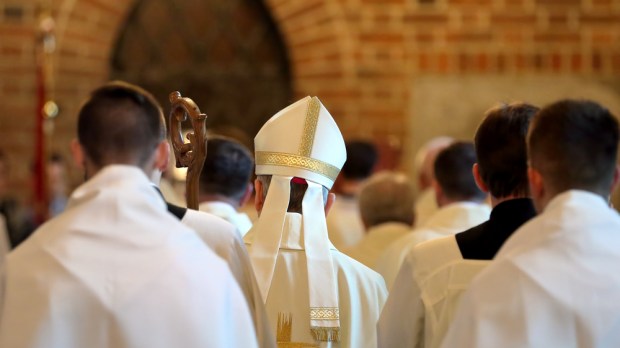A recent survey of US Catholic priests found that while the majority of priests are happy in their vocation, nearly half are exhibiting early signs of burning out under increased workloads due to their dwindling numbers. The study, “Well-being, Trust, and Policy in a Time of Crisis: Highlights from the National Study of Catholic Priests,” was conducted by The Catholic Project, which surveyed 3,516 priests from 191 US Catholic dioceses.
Well-being
The Catholic Project measured the contentment of US priests through a list of 10 questions covering key dimensions of well-being. These include: happiness and life satisfaction, mental and physical health, sense of meaning and purpose, character and virtue, and close social relationships. The average well-being score was 82% for priests and 83% for bishops.
Overall, 77% of priests and 81% of bishops could be categorized as “flourishing” within their vocations. While this sense of meaning and purpose in their vocation is a key contributor to their well-being, this is not to say priests are without their stressors. It was found that 4% of priests are contemplating leaving the priesthood and many more are showing signs of mental wear that could lead to a “burnout” in their priestly ministries.
Burnout
In order to assess the likelihood of a priest’s “burnout,” The Catholic Project examined three indicators, taken from “the Flourishing in Ministry study by Notre Dame psychologist Matt Bloom.” Indicators included: cynicism, feeling emotionally drained, and feeling worn out after ministry work.
It was discovered that 45% of responding priests exhibited at least one indicator of burning out in their ministry. The study found that the group with the highest rate of reported “burnout” indicators was diocesan priests (50%), followed by religious priests (33%). Only 9% were found to exhibit “severe burnout,” which means exhibiting multiple indicators.
The study also found that younger priests are far more likely to “burn out” than their older counterparts. This gap can be seen the clearest in diocesan priests, where 60% of priests under the age of 45 showed signs of burning out, with an additional 8% reporting “severe burnout.” The gap closed to about 45% in the 45 – 60 age group and continued to reduce in groups older than this.
Trust in the bishops
The study suggested several explanations for the high levels of “burnout” indicators among US priests, with the shortage of priests causing an increased workload being of particular concern. Another factor the survey found to reduce a priests sense of well-being was their perspective on the bishops.
Less than half (49%) of diocesan priests expressed confidence in their own bishop and less than a quarter (24%) said they had “confidence in the leadership and decision making of the bishops” as a whole. In an explanation, one unnamed diocesan priest commented:
“I don’t really trust most of the bishops, to be honest with you. I’ll show them all a great amount of respect. And if I was in their diocese, I would really serve them and try. But just looking across the United States and looking across a lot of bishops … I would say I have an overall negative opinion of bishops in the United States … They’re really not leaders or they’re just kind of chameleons… looking to climb up the ladder.”
The study went one to note that the “erosion of trust” between bishops and priests can account for an 11.5% reduction in a priest’s sense of well-being. It was also found that a high sense of trust in a priest’s bishop can greatly influence a priest’s sense of well-being. Those who reported a firm trust in their bishop were found to be doing far better than others.
For their part, 92% of responding bishops said they would help a priest with personal struggles to the best of their ability. Responding priests, however, did not share this sentiment, as only 36% of them said they would feel comfortable approaching their bishop with a personal problem. One priest was cited as saying he feels as though bishops view their priests as “liabilities.”
Recommendations
The survey concluded by asking priests what measures they would like to see in order to improve their trust in their bishops. One suggestion was to strengthen the personal relationships between priests and bishops; to form bonds of father and brother rather than employer and employee. Another was for bishops to keep open lines of communication with their priests, especially on matters of finance and assignments.
Priests also expressed that they would like to see more transparency in the review process for allegations of abuse. The abuse crisis in the Church was found to be one of the most common causes for “burnout” indicators, as well as the primary reason cited for a lack of trust in the bishops. Finally, priests said they would like to see more accountability from US bishops. One respondent noted:
“Bishops should have someone they are accountable to. There is no system of checks and balances with their authority.”



